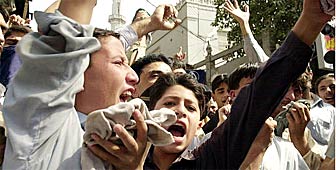Swiss ambassador warns of threat to Pakistan

In the wake of bombings by the United States and Britain on Afghanistan, the Swiss ambassador to Pakistan, Christian Dunant, has warned that a prolonged campaign could put President Musharraf's government under considerable strain.
“I think the [Pakistani] government is secure and has the situation in hand – but you never know, ” Dunant told swissinfo. “Musharraf has spoken of around 10 to 15 per cent of people who might be very sensitive to the arguments of [Islamic] extremists in Pakistan – that’s 15 to 20 million people – it’s an enormous number of people.
“President Musharraf said he hoped military action would be short because the demonstrations that have already been taking place in Pakistan could take on another dimension,” said Dunant. “If the military action was short, it would be easier to control the protests.”
Dunant said that although the situation in the capital, Islamabad, was relatively calm on Monday, there had been reports of protests directed against the American cultural centre.
Meanwhile, Bernard Imhasly, a Swiss journalist who has just returned from an extended stay in Pakistan, said he did not rule out the possibility of a coup in Pakistan if the US continued its attacks against Afghanistan.
He said protesters’ actions had become more extreme since the start of US strikes. “There is definitely much more aggressiveness. People are attacking offices of the United Nations – of the UNHCR, of Unicef – and they’ve partly burned them down. That’s something we haven’t seen before. But it’s still too early to say that it will get out of hand.”
Imhasly warned that the degree of violence in Pakistan was likely to increase if the number of civilian casualties in Afghanistan was high. “This could trigger another wave of refugees, which could force the Pakistani government to reopen the border, which in turn could trigger major social unrest.”
The unrest might not be directed wholly against the government, said Imhasly, but also against Afghan refugees, against whom there was a “grudging resentment” within some sections of the Pakistani population. Refugees were often seen as a severe strain on the country’s already limited resources, he said.
In addition, there was also tension within the Pakistani armed forces, spurred on by the presence of pro-Taliban officers, two of whom were replaced by Musharraf on Monday, explained Imhasly.
“There are a number of officers who are sympathetic to the Taliban cause, and this latent conflict within the armed forces could be unleashed if the campaign continues. But the risk of this happening would be greatly minimised if, as the Americans hope, the Taliban edifice crumbles from within, and only limited military attacks are necessary.”
Dunant for his part expressed optimism that US strikes on Afghanistan would be brief. It was President George W Bush’s campaign against terrorism as a whole which was likely to be more long-term, he said.
“There will be a lot of measures [to fight against terrorism] and this will take a long time before being effective,” says Dunant. “It’s not just a question of military action.”
swissinfo

In compliance with the JTI standards
More: SWI swissinfo.ch certified by the Journalism Trust Initiative
You can find an overview of ongoing debates with our journalists here. Please join us!
If you want to start a conversation about a topic raised in this article or want to report factual errors, email us at english@swissinfo.ch.